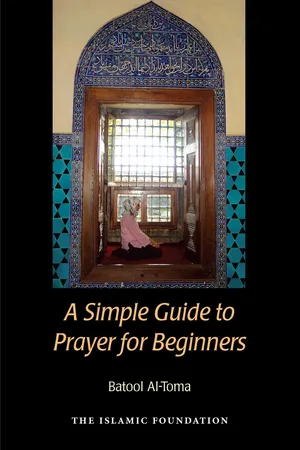
- 74 pages
- English
- ePUB (mobile friendly)
- Available on iOS & Android
eBook - ePub
About this book
This book has been prepared to assist and remind Muslims how to perform salah, prayer in Islam. It is ideal for new Muslims as it includes pictures, step-by-step instructions, and the words Muslims must recite during the prayer in transliteration and English.
Frequently asked questions
Yes, you can cancel anytime from the Subscription tab in your account settings on the Perlego website. Your subscription will stay active until the end of your current billing period. Learn how to cancel your subscription.
No, books cannot be downloaded as external files, such as PDFs, for use outside of Perlego. However, you can download books within the Perlego app for offline reading on mobile or tablet. Learn more here.
Perlego offers two plans: Essential and Complete
- Essential is ideal for learners and professionals who enjoy exploring a wide range of subjects. Access the Essential Library with 800,000+ trusted titles and best-sellers across business, personal growth, and the humanities. Includes unlimited reading time and Standard Read Aloud voice.
- Complete: Perfect for advanced learners and researchers needing full, unrestricted access. Unlock 1.4M+ books across hundreds of subjects, including academic and specialized titles. The Complete Plan also includes advanced features like Premium Read Aloud and Research Assistant.
We are an online textbook subscription service, where you can get access to an entire online library for less than the price of a single book per month. With over 1 million books across 1000+ topics, we’ve got you covered! Learn more here.
Look out for the read-aloud symbol on your next book to see if you can listen to it. The read-aloud tool reads text aloud for you, highlighting the text as it is being read. You can pause it, speed it up and slow it down. Learn more here.
Yes! You can use the Perlego app on both iOS or Android devices to read anytime, anywhere — even offline. Perfect for commutes or when you’re on the go.
Please note we cannot support devices running on iOS 13 and Android 7 or earlier. Learn more about using the app.
Please note we cannot support devices running on iOS 13 and Android 7 or earlier. Learn more about using the app.
Yes, you can access A Simple Guide to Prayer for Beginners by Batool Al-Toma in PDF and/or ePUB format, as well as other popular books in Theology & Religion & Islamic Theology. We have over one million books available in our catalogue for you to explore.
Information



Ṣalāh or Prayer is the second of the five pillars of Islam after Shahāda – to testify to the oneness of Allah and the Prophethood of Muḥammad (PBUH). The other three are: Zakāh – an obligatory charge on your wealth paid annually for those in need; Ṣawm – fasting during the month of Ramaḍan, and Ḥajj – making the pilgrimage to Makka (if it is within your means). However, just as a building does not consist only of four walls, Islam does not exist on these five pillars alone but is a complete way of life encompassing all aspects of the spiritual, moral and physical well-being of humankind.
Prayer is the most direct way of communicating with Allah, of establishing and nourishing that personal relationship with your Lord and Sustainer
The first pillar – Shahāda, that is to testify that there is no god but Allah and that Muḥammad (PBUH) is His Messenger – is the pivot around which the whole of Islam revolves. The second – mandatory daily Prayers – is the most direct way of communicating with Allah, of establishing and nourishing that personal relationship with your Lord and Sustainer, without which you cannot be a good Muslim.
The Arabic word Ṣalāh is a wide and comprehensive term which cannot be adequately translated by the English term ʿPrayer’. Ṣalāh, while it embodies the concepts of supplication, petition and invocation implied in the English term ʿPrayer’, is much more than this.
Prayer in Islam is not merely a series of words and movements practised occasionally, or even regularly, without much thought as to its meaning or purpose. Rather it is a comprehensive form of communication with Allah which, if it is ʿestablished’ in the heart, brings the desired results and ties the individual and the community to their Lord in a fruitful and positive way. It awakens your heart to your Lord and becomes the practical expression of your love for your Creator. Withdrawing from the mundane matters of life, and turning towards Allah, knowing that He is not only listening but responding to each worshipper, creates a warm, cherished feeling within, knowing that the love shown to your Creator is reciprocated seven hundred-fold.
Turning towards Allah, knowing that He is not only listening but responding to each worshipper, creates a warm, cherished feeling within, knowing that the love shown to your Creator is reciprocated seven hundred-fold
There are no shows of extravagance connected to the performance of Prayer. It is a simple and humbling exercise prior to which you are requested to observe some basic aspects of cleanliness and purity, referred to as ablution or Wuḍū. The Prayer, once it is truly understood, gives an infinite strength to live by the will of Allah, to abstain from what He dislikes and to deal with the trials of life with commitment and confidence in Him. It can be the best consolation and means of encouragement during times of stress and anxiety.
The Qur’ān continuously encourages the observance of Prayer:
And be steadfast in Prayer and give in charity; and whatever good you send ahead of you for your souls you shall find it with Allah: for Allah sees all that you do. (Sūrah 2: 110)
Guard strictly your Prayers, especially the middle Prayer, and stand before Allah in a devout manner. (Sūrah 2: 238)
Great importance is attached to the conscious observance of the Prayer as it is the first thing about which you will be questioned and held accountable for on the Day of Judgement.
There is abundant evidence in the Qur’ān that Prayer was a requirement and was practised in some form or another by the earlier Prophets and their followers, as an essential part of their relationship with Allah. Prophet Abraham (PBUH) sought Allah’s grace and support in his efforts to establish Prayer among his people:
My Lord, make me establish regular Prayer, and make my offspring do likewise, my Lord, accept my supplication. (Sūrah 14: 40)
Allah spoke to Prophet Moses (PBUH), saying:
Prayer is the first thing about which you will be questioned and held accountable for on the Day of Judgement
Verily I am Allah, there is no god but I, so serve Me only and perform Prayer for the remembrance of Me. (Sūrah 20: 14)
Prophet Jesus (PBUH) said of his Lord:
And He made me blessed wherever I may be, and He enjoined upon me Prayer and Almsgiving as long as I live. (Sūrah 19: 31)
In the same way the instruction to pray was reaffirmed in the Qur’ān to become the cornerstone of the mission of Prophet Muḥammad (PBUH).
And recite, (O Prophet), what is sent of the Book to you, and perform regular Prayer: for Prayer restrains from shameful and evil deeds; and remembrance of Allah is the greatest thing in life without doubt. And Allah knows the deeds that you do. (Sūrah 29: 45)
Prayer, therefore, is a key to several different treasures. It is a means of remembering Allah, our Creator and the Source of everything which surrounds us; it is a means through which we seek His help and guidance so that our lives will be more fruitful here and in the Hereafter, as we strive to live according to His will; it is a time to ask for forgiveness from Allah for our faults and to sincerely thank Him for the treasures He has provided us with and for the bounties we have received, both material and spiritual.
Prayer is a means of remembering Allah and seeking His help and guidance to strive to live according to His will
New Beginnings
You have just recited your Shahāda – testifying to the Oneness of Allah and the Prophethood of Muḥammad (PBUH) thereby entering the fold of Islam. It is now necessary that you perform Ghusl – take a full shower. This is an act of purification which you should attend to as soon as the opportunity presents itself.
In the meantime those other Muslims present who have just witnessed this joyous occasion are inviting you to join them for the Prayer. It is understandable that you may not be familiar with the Prayer and its requirements at this stage and therefore feel a little apprehensive – however, this is an important learning experience the observance of which should not be missed.
Since this is a communal Prayer, the Imām, by leading it, takes on the responsibility of the Prayer for the rest of the worshippers. The worshipers should not make any movement ahead of the Imām, nor should they anticipate any of his movements but together, as a unified congregation, they follow his movements which are (with one exception) preceded by the words Allāhu Akbar – ʿAllah is Greatest’ – until the final Salām to his right and then left shoulder which concludes the Prayer.
For some time, when the time for the Prayer arrives, because you are new to Islam you may find yourself in the same predicament. Prepare yourself for Prayer by first performing ablution – Wuḍū’. Then simply follow the movement procedure of the Prayer. You may remember and praise Allah by using simple phrases which you find easy to recall such as Allāhu Akbar – ʿAllah is Greatest’, Subḥān Allāh – ʿGlory to Allah’, Al-Ḥamdulillāh – ʿAll Praise is due to Allah’ and complete the movement sequence to the end. You may feel the need to hold a guide to Prayer in your hand or listen to a recording of the Prayer, repeating as you hear the words. In time you will be able to memorise and recall the entire procedure.
Ghusl is an act of purification which you should attend to as soon as the opportunity presents itself.
We hope that by reading on, these guidelines will help you towards achieving that goal.
The Obligatory or Farḍ Prayers
It is preferable that we first understand, learn and feel confident with the obligatory or Farḍ Prayers of which there are five. These are performed at different intervals during the day:
1. F...
Table of contents
- Cover
- Title Page
- Copyright Page
- Contents
- Preface
- Chapter I Introduction to Prayer in Islam – Ṣalāh
- Chapter II Ablution or Wuḍū’
- Chapter III The Call to Prayer – Adhān and Iqāma
- Chapter IV Congregational Prayer and When it Must be Performed
- Chapter V Making Petition or Supplication – Duʿā’
- Chapter VI Greetings and other Recommended Expressions
- Chapter VII The Performance of the Dawn or Fajr Prayer in Arabic with Illustrations
- Appendix Short Sūrahs From the Qur’ān